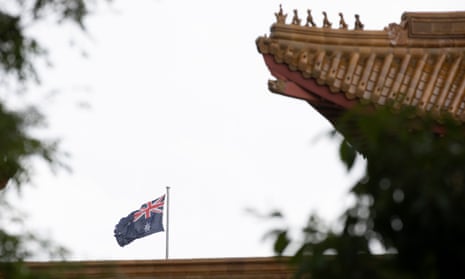A former New South Wales Labor staffer under investigation for foreign interference has lost a high court bid to quash warrants allowing police to access his chats on social media.
John Zhang contested the validity of three search warrants issued during investigations into his alleged work on behalf of Chinese state interests while employed in the parliamentary office of the state upper house MP Shaoquett Moselmane.
Zhang, who has not been charged with any offence, claimed the warrants were unclear in identifying which foreign power’s interests and policy goals he’d allegedly advanced.
But the high court on Wednesday unanimously held that Zhang’s argument was “untenable”.
Each warrant identified the foreign principal as “the government of the People’s Republic of China”, which is a foreign government principal as defined by law, the court said.
The warrants enabled federal agents to seize material they believed was relevant to the offence of reckless foreign interference – including copying data from mobile phones and other electronic devices.
Phones and other devices were also physically removed, with steps taken to extract the data by using passcodes the Chinese-born Australian citizen was compelled to provide.
The warrants alleged Zhang and undefined other people had acted on behalf of “Chinese state and party apparatus” to intentionally engage Moselmane to advance China’s interests and policy goals “by providing support and encouragement to [the MP] for the advocacy of Chinese state interests”.
Zhang was allegedly reckless that the conduct would influence NSW Labor policy positions on the Chinese government and the views of NSW voters.
Moselmane, a former assistant president of the NSW upper house, employed Zhang from October 2018 to September 2020.
As part of the investigation, the former Rockdale mayor’s home and office were raided in June 2020 by Asio and federal police, leading to Moselmane moving to the crossbench.
He had months earlier stood down as assistant president of the upper house after praising the Chinese president Xi Jinping’s “unswerving leadership” and decisiveness in response to the Covid-19 pandemic.
The MP later defended the views by saying they had been promulgated by the World Health Organization and the then US president Donald Trump.
He returned to the Labor fold in November, providing copies to the parliament of his police interview in which an agent said he was not considered a suspect in the foreign interference investigation.
“The warrant [issued to Moselmane] ... clearly states that I was not even aware of what was alleged to have taken place,” he said last year. “I know I did nothing wrong.”
Zhang also failed to convince the high court the search warrants should be binned because the alleged offence of reckless foreign interference was invalid.
A reference to “covert” conduct could refer to “private” or “not overt”, he argued, suggesting the offence infringed the implied freedom of political communication.
But the federal attorney general proffered a narrower reading of the word “covert”, treating it as involving some element of nefarious concealment or secrecy.
The court said the warrants may have been drafted on an understanding that conduct was “covert” only because it involved private social media communications. But any requirement of the word having to have an element of “nefarious concealment or secrecy” wouldn’t deprive the warrants of sufficient content or clarity to indicate the areas of the search, the court said.
